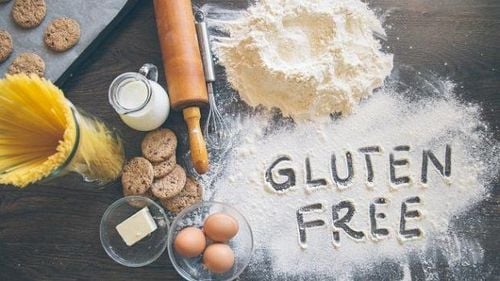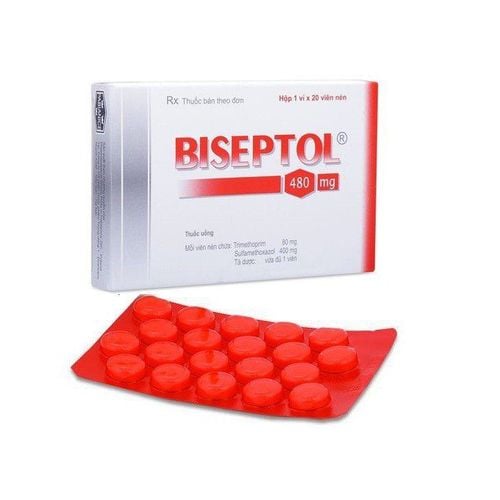This is an automatically translated article.
Gluten, a group of proteins found in certain grains, such as wheat, rye, and barley, helps foods maintain their shape by providing elasticity and moisture. Although gluten is safe for most people, people with conditions such as celiac disease or gluten sensitivity should avoid it to prevent health effects.1. Grains
Some select whole grains contain gluten, while the rest are naturally gluten-free. However, when choosing foods that are grains, you need to check the label to determine if gluten is present in the food. Because even whole grains or gluten-free foods can be contaminated with gluten, especially if they're made in the same facility as the gluten-containing food. For example, oats are often processed in facilities that also process wheat, which can lead to cross-contamination.
Gluten Free Whole Grains:
Quinoa Brown Rice Wild Rice Buckwheat Sorghum Sesame Flour Millet Amaranth Teff Quince Flour Oats Grains to Avoid:
Whole Wheat, Wheat berries, ... Rye Barley Triticale These gluten-containing grains are commonly used to make products such as breads, crackers, pasta, cereals, baked goods and snacks.
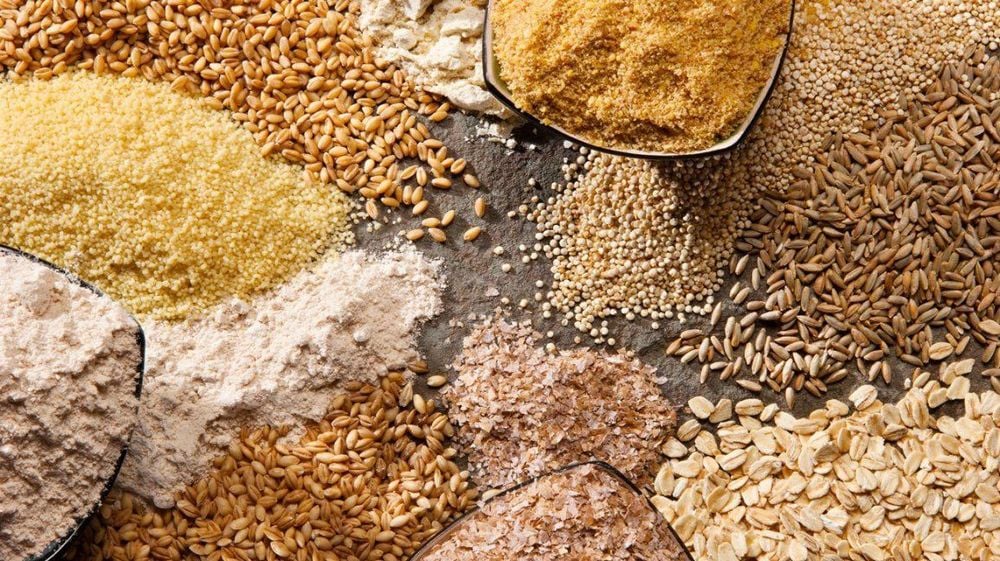
Quinoa, gạo lứt, yến mạch, teff,... đều là ngũ cốc không chứa gluten
2. Fruits and vegetables
All fresh fruits and vegetables are naturally gluten-free. However, some processed fruits and vegetables may contain gluten, which is sometimes added for flavor or as a thickener. Gluten-containing ingredients that may be added to processed fruits and vegetables include hydrolyzed wheat protein, modified food starch, malt, and maltodextrin.
Some fresh fruits and vegetables that you can use on a gluten-free diet:
Citrus fruits Bananas Apples Berries Peach Pear Cruciferous vegetables, including: Broccoli and cotton broccoli Green leafy vegetables such as: Spinach, kale and Swiss chard Potatoes, corn and squash Bell peppers Mushrooms Onions Carrots Radishes Green beans Some fruits to check before consuming:
Canned fruits and vegetables: Can be canned with gluten-containing sauces. Fruits and vegetables canned with water or natural juices may be gluten-free. Frozen fruits and vegetables: May contain added flavorings and gluten-containing sauces. Frozen varieties are usually gluten-free. Dried fruits and vegetables: Some may include gluten-containing ingredients. Dried, sugar-free fruits and vegetables tend to be gluten-free. Chopped Fruits and Vegetables: They Can Be Cross-Contaminated with Gluten
3. Protein
Many foods contain protein, including foods of animal origin and foods of plant origin. Most are naturally gluten-free. But these foods can be combined with some other ingredients such as soy sauce, flour, etc. So there may be gluten contamination from these ingredients.
Gluten free protein
Legumes Nuts and seeds Red meat Poultry Seafood Traditional soy foods Some protein foods need to be tested before serving
Lunch or deli meats Meats grind Protein has been used with sauces or seasonings Instant proteins Proteins to avoid
Which meats, poultry or fish have been breaded Protein used with wheat soy sauce White meat
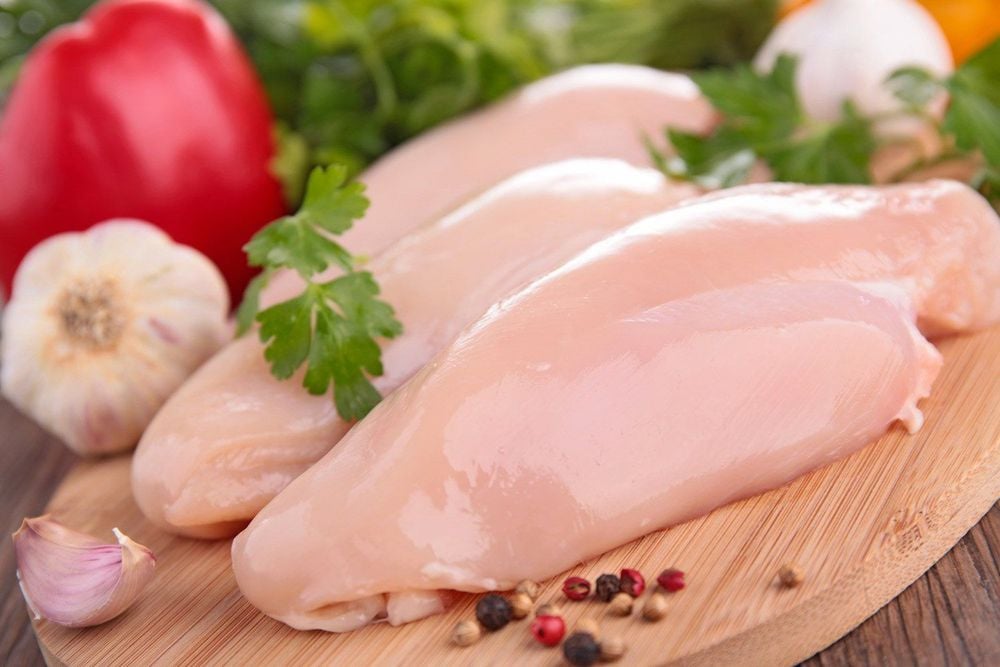
Thịt trắng là thực phẩm cần tránh
4. Dairy products
Most dairy products are naturally gluten-free. However, those that are flavored and contain additives should always be thoroughly tested for gluten. Some common gluten-containing ingredients that may be added to dairy products include: Thickeners, malt, and modified food starches.
Gluten-free dairy products
Milk Butter and dairy Cheese Cream Cheese Sour cream Yogurt Dairy products to be tested before serving
Flavored milk and yogurt Processed cheese products , such as Cream cheese sauces and spreads, contain additives that contain gluten Dairy products to avoid Malt milk drinks
5. Fats and Oils
Fats and oils generally do not contain gluten compounds. Gluten-containing additives can be mixed with fats and oils to flavor and thicken foods.
Gluten-free oils and fats
Butter and dairy Olives and olive oil Butter and avocado oil Coconut oil Vegetable and nut oils, including: Sesame, canola and sunflower oils Fats and oils need to check before use
Oils with added flavor or seasoning
6. Drinks
Some beverages are fortified with gluten-containing additives. Additionally, some alcoholic beverages are made with malt, barley, and other gluten-containing grains and should be avoided on a gluten-free diet.
Gluten-free beverages
Water 100% juice Coffee Tea Wine, cider and beer made with gluten-free grains, such as quinoa or sorghum seeds Sports drinks, soda or energy drinks Water lemon Drinks to check before use
Beverages with added flavors or blends, such as coffee coolers Distilled alcohol, such as vodka, gin and whiskey - even if labeled no contain gluten, as they are known to cause reactions in some people Ready-made smoothies Drinks to avoid
Beer made with gluten grains Non-distilled alcohol
7. Condiments, sauces and condiments
Condiments, sauces contain gluten ingredients. Although most condiments, sauces and seasonings are naturally gluten-free, some additives are added that contain gluten such as: Emulsifiers, stabilizers or flavor enhancers.
Gluten-free condiments, sauces and condiments
Tamari Coconut aminos White vinegar, distilled vinegar and apple cider vinegar Seasonings, sauces and seasonings to check before serving
Ketchup and mustard Worcestershire sauce Tomato Sauce Pickles Roasted Meat Sauce Mayonnaise Salad Sauce Pasta Sauce Dried Marinades Marinades Gravy and Stuffing Mix Rice Vinegar Seasonings, Sauces to Avoid
Malt Vinegar
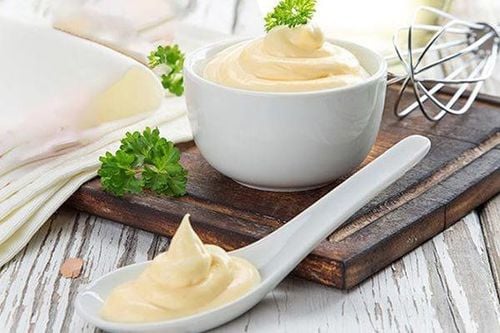
Cần kiểm tra mayonnaise trước khi sử dụng
8. Gluten Free Diet
A gluten-free diet is often recommended for people with celiac disease, a condition that causes an immune response to consuming foods containing gluten.
People with non-celiac gluten sensitivity should also avoid gluten, as it can contribute to symptoms such as bloating, stomach pain, and diarrhea.
Although more research is needed, some studies also suggest that a gluten-free diet may be beneficial for people with irritable bowel syndrome - a chronic disorder characterized by digestive problems such as stomach pain, bloating, diarrhea and constipation.
9. Risks of the gluten-free diet
Gluten is found naturally in many nutritious foods, including: Wheat, barley and rye.
Meanwhile, some gluten-free processed food products are not fortified with vitamins and minerals. Therefore, following a gluten-free diet, lack of variety can increase the risk of folate, riboflavin, niacin and iron deficiencies.
Gluten-free diets also tend to have less dietary fiber content. Therefore, it is essential to ensure that you are getting these important nutrients from other sources as part of a healthy, gluten-free diet to help reduce the risk of side effects.
Please dial HOTLINE for more information or register for an appointment HERE. Download MyVinmec app to make appointments faster and to manage your bookings easily.
Reference source: healthline.com




